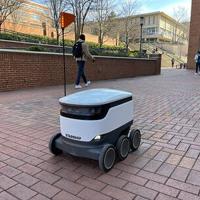Autonomous robots will be a food delivery option for students on the UNC Charlotte campus in early March.
Starship Technologies has partnered with Charlotte via the catering company Chartwells on campus. Charlotte will deploy 30 to 40 robots to start deliveries in early March.
The robots were seen on campus in the first week of the spring 2023 semester, mapping out the campus.
Jody Thompson, director of Auxiliary Services, said, “Originally, there were only two robots. They were here for a short time and weren’t in full operation yet. They were here to map the campus.”
To order food with the robots, students need the Starship Technologies mobile delivery app that will mirror the Niner Diner app.
Ben Kolnos, senior retail director with Chartwells, said, “Eventually, all the offerings that you can get on the Niner Diner app will be able to be delivered. The eventual plan is to have them [the robots] on our Niner Diner app.”
The Starship Technologies app will also be connected to students’ meal plans.
“The Starship app will be accepting the campus card dollars, so even if it is a separate app, you can still use your DB for delivery,” Kolnos said.
The robots do not go into buildings and will have designated parking areas outside retail outlets. When an order is placed, the location receives it, and an employee will take the food out and load it into the robot to send it off.
“Parking will be outside the food locations, but if you are in any academic buildings, you can drop a pin and say, ‘This is where I am. Please bring me my food to this location,’ and that’s where they will end up . Then they go back to get the next order after that,” Thompson said.
They will be parked outside, ready in the morning and will sit there based on the hours of operation. The retail outlets will have them based on when orders are coming in, and they can be ordered from any location on campus.
“We don’t have a huge dining presence on the PORTAL side of the campus past the football stadium. There are a lot of students that have classes over there, and they don’t have time to return to the dining side of campus. We hope to utilize the robots to bring them the great offerings that we have,” Kolnos said.
In preparation for its official launch, Charlotte is building a hub in the CAB building. The robots must go to every night while not operating and charging.
“Where all the robots will live every night is being finished up on campus. Once that is complete, we’ll get the shipment of the robots and finalize things,” Kolnos said.
The robots carry hot and cold items and contain insulated lining to keep food at its intended temperature until the end of the delivery.
According to Starship Technologies, they contain a “suite of sensors” and 12 cameras to enable the robots to see where they are going. They travel about four miles per hour and can navigate around objects, people and curbs.
“They will throttle based on how fast people are walking too. So they’ll slow down if there’s a group in front of them,” Thompson said.
The Starship Technologies app also has song features and has programmed the robots to speak.
“There are some fun things that you can do in the app. For example, you can have a delivery song from Lizzo, or you’ll see them on campus, and if you’re kind of in the way, they’ll say , ‘excuse me,'” Kolnos said.
Starship Technologies will provide some opportunities for students to be employed on campus and work with robots.
“There will be a few students that are hired by Starship to kind of man the hub. So they’ll be charging them at night and making sure that they’re cleaned out, stay in good working order, and do repairs and things like that,” Thompson said.
Charlotte started getting Starship Technologies robots on campus in 2019 after talking with other universities participating in the program via Chartwells.
“We like to be at the forefront of technology and always push the program for the students further. They’re going to be a great addition to the Niner community,” Kolnos said.

